401005 Human Relationships and Life Transitions Essay - Spring 2018
VerifiedAdded on 2023/06/04
|6
|1746
|59
Essay
AI Summary
This essay explores the intricate relationship between human connections and life's transformative stages, particularly focusing on psychosocial development across an individual's lifespan. It emphasizes the critical importance of understanding these dynamics for personal growth and development, especially during childhood transitions from ages 12 to 20. Through a case study of a two-year-old child named Julie, the essay delves into the psychosocial, social, and cognitive components of human development, highlighting the influence of factors like toilet training and caregiver interactions on a child's psychological well-being. It references Erik Erikson's stages of psychosocial development, connecting these stages to Julie's early childhood experiences and discussing how various influences, including cultural norms and nursing practices, impact a child's ability to form healthy relationships and navigate life transitions successfully. The essay concludes by underscoring the vital role of psychosocial development in a child's early years and the need for caregivers and nurses to foster effective communication and overall well-being.
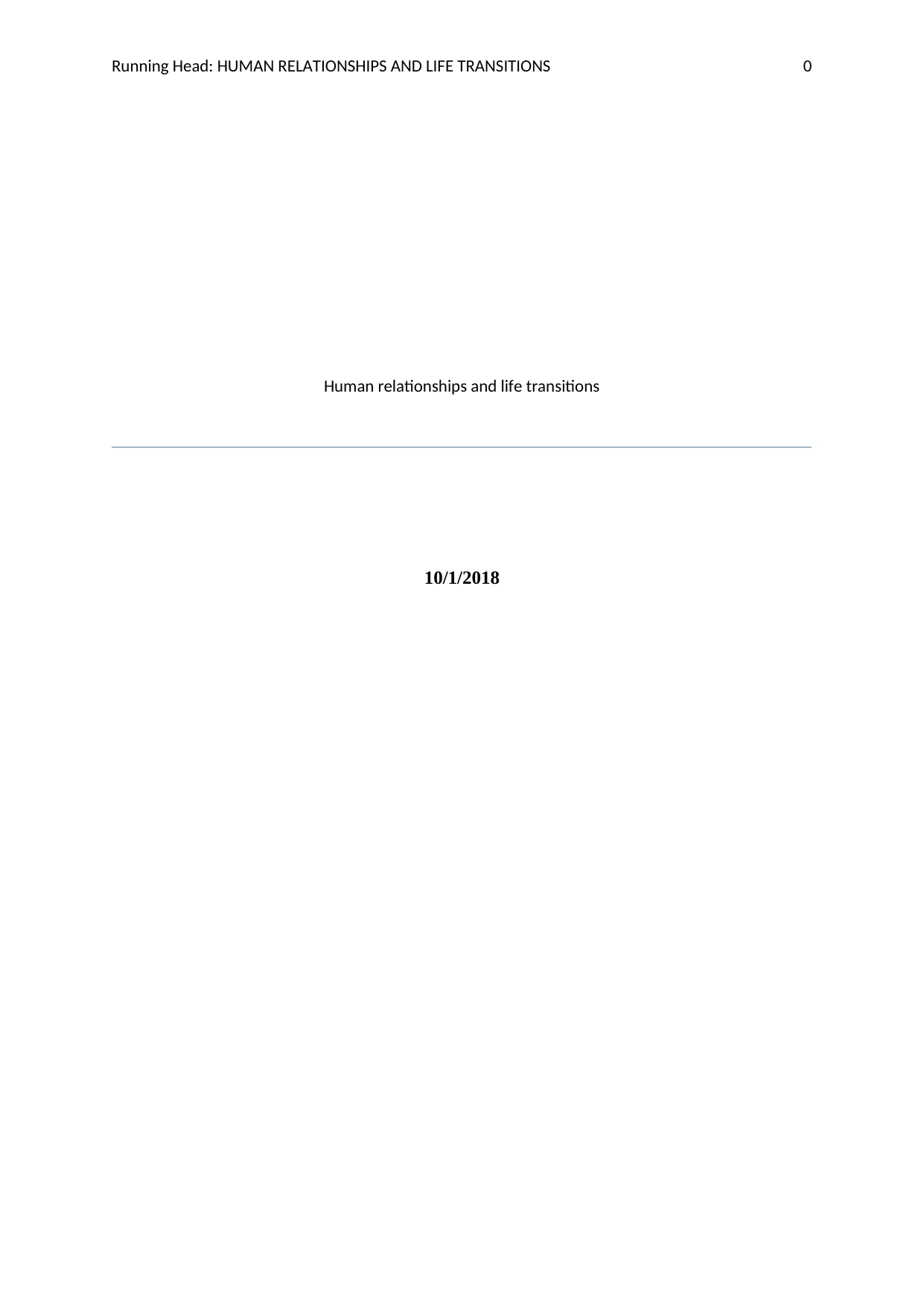
Running Head: HUMAN RELATIONSHIPS AND LIFE TRANSITIONS 0
Human relationships and life transitions
10/1/2018
Human relationships and life transitions
10/1/2018
Paraphrase This Document
Need a fresh take? Get an instant paraphrase of this document with our AI Paraphraser
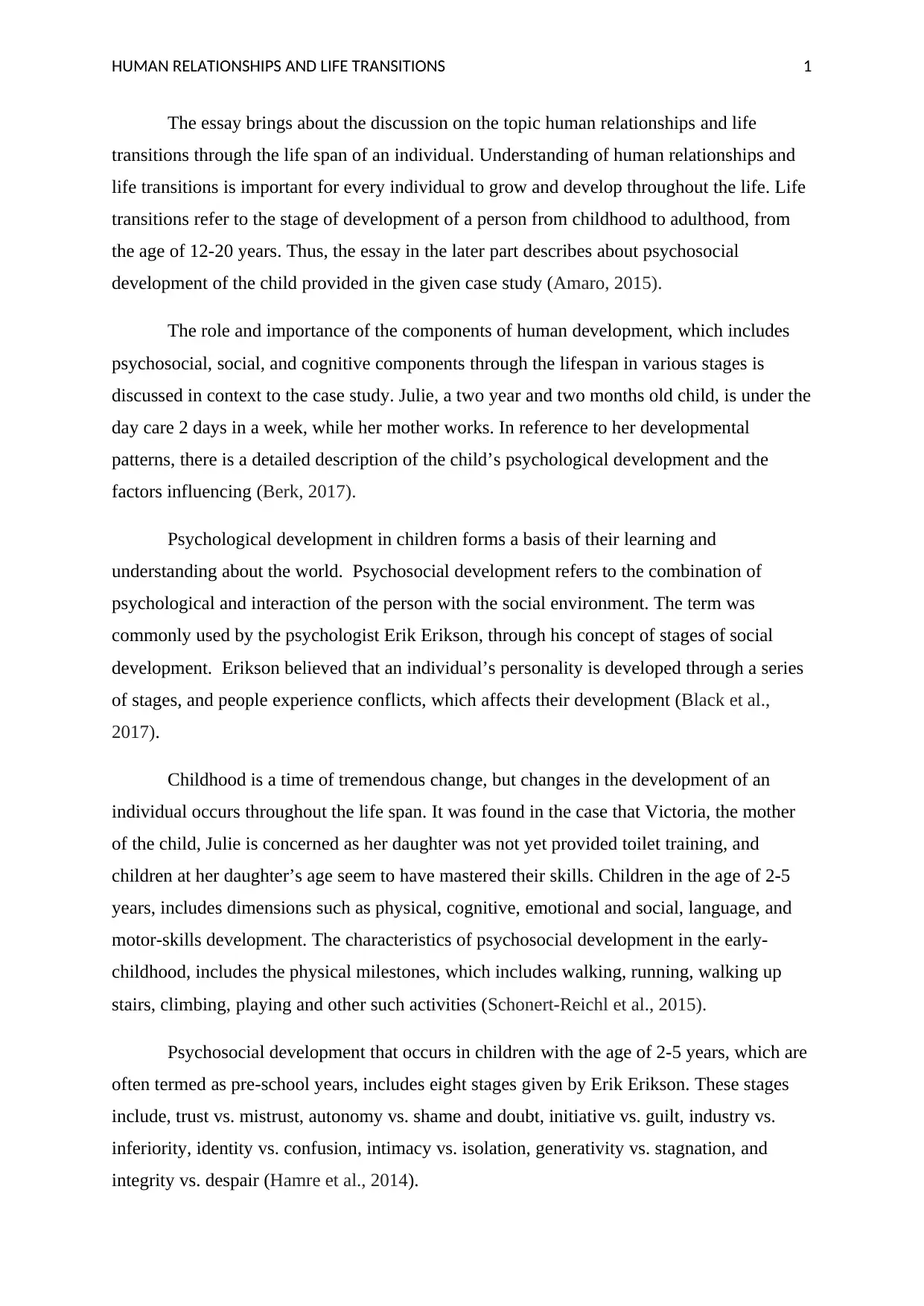
HUMAN RELATIONSHIPS AND LIFE TRANSITIONS 1
The essay brings about the discussion on the topic human relationships and life
transitions through the life span of an individual. Understanding of human relationships and
life transitions is important for every individual to grow and develop throughout the life. Life
transitions refer to the stage of development of a person from childhood to adulthood, from
the age of 12-20 years. Thus, the essay in the later part describes about psychosocial
development of the child provided in the given case study (Amaro, 2015).
The role and importance of the components of human development, which includes
psychosocial, social, and cognitive components through the lifespan in various stages is
discussed in context to the case study. Julie, a two year and two months old child, is under the
day care 2 days in a week, while her mother works. In reference to her developmental
patterns, there is a detailed description of the child’s psychological development and the
factors influencing (Berk, 2017).
Psychological development in children forms a basis of their learning and
understanding about the world. Psychosocial development refers to the combination of
psychological and interaction of the person with the social environment. The term was
commonly used by the psychologist Erik Erikson, through his concept of stages of social
development. Erikson believed that an individual’s personality is developed through a series
of stages, and people experience conflicts, which affects their development (Black et al.,
2017).
Childhood is a time of tremendous change, but changes in the development of an
individual occurs throughout the life span. It was found in the case that Victoria, the mother
of the child, Julie is concerned as her daughter was not yet provided toilet training, and
children at her daughter’s age seem to have mastered their skills. Children in the age of 2-5
years, includes dimensions such as physical, cognitive, emotional and social, language, and
motor-skills development. The characteristics of psychosocial development in the early-
childhood, includes the physical milestones, which includes walking, running, walking up
stairs, climbing, playing and other such activities (Schonert-Reichl et al., 2015).
Psychosocial development that occurs in children with the age of 2-5 years, which are
often termed as pre-school years, includes eight stages given by Erik Erikson. These stages
include, trust vs. mistrust, autonomy vs. shame and doubt, initiative vs. guilt, industry vs.
inferiority, identity vs. confusion, intimacy vs. isolation, generativity vs. stagnation, and
integrity vs. despair (Hamre et al., 2014).
The essay brings about the discussion on the topic human relationships and life
transitions through the life span of an individual. Understanding of human relationships and
life transitions is important for every individual to grow and develop throughout the life. Life
transitions refer to the stage of development of a person from childhood to adulthood, from
the age of 12-20 years. Thus, the essay in the later part describes about psychosocial
development of the child provided in the given case study (Amaro, 2015).
The role and importance of the components of human development, which includes
psychosocial, social, and cognitive components through the lifespan in various stages is
discussed in context to the case study. Julie, a two year and two months old child, is under the
day care 2 days in a week, while her mother works. In reference to her developmental
patterns, there is a detailed description of the child’s psychological development and the
factors influencing (Berk, 2017).
Psychological development in children forms a basis of their learning and
understanding about the world. Psychosocial development refers to the combination of
psychological and interaction of the person with the social environment. The term was
commonly used by the psychologist Erik Erikson, through his concept of stages of social
development. Erikson believed that an individual’s personality is developed through a series
of stages, and people experience conflicts, which affects their development (Black et al.,
2017).
Childhood is a time of tremendous change, but changes in the development of an
individual occurs throughout the life span. It was found in the case that Victoria, the mother
of the child, Julie is concerned as her daughter was not yet provided toilet training, and
children at her daughter’s age seem to have mastered their skills. Children in the age of 2-5
years, includes dimensions such as physical, cognitive, emotional and social, language, and
motor-skills development. The characteristics of psychosocial development in the early-
childhood, includes the physical milestones, which includes walking, running, walking up
stairs, climbing, playing and other such activities (Schonert-Reichl et al., 2015).
Psychosocial development that occurs in children with the age of 2-5 years, which are
often termed as pre-school years, includes eight stages given by Erik Erikson. These stages
include, trust vs. mistrust, autonomy vs. shame and doubt, initiative vs. guilt, industry vs.
inferiority, identity vs. confusion, intimacy vs. isolation, generativity vs. stagnation, and
integrity vs. despair (Hamre et al., 2014).
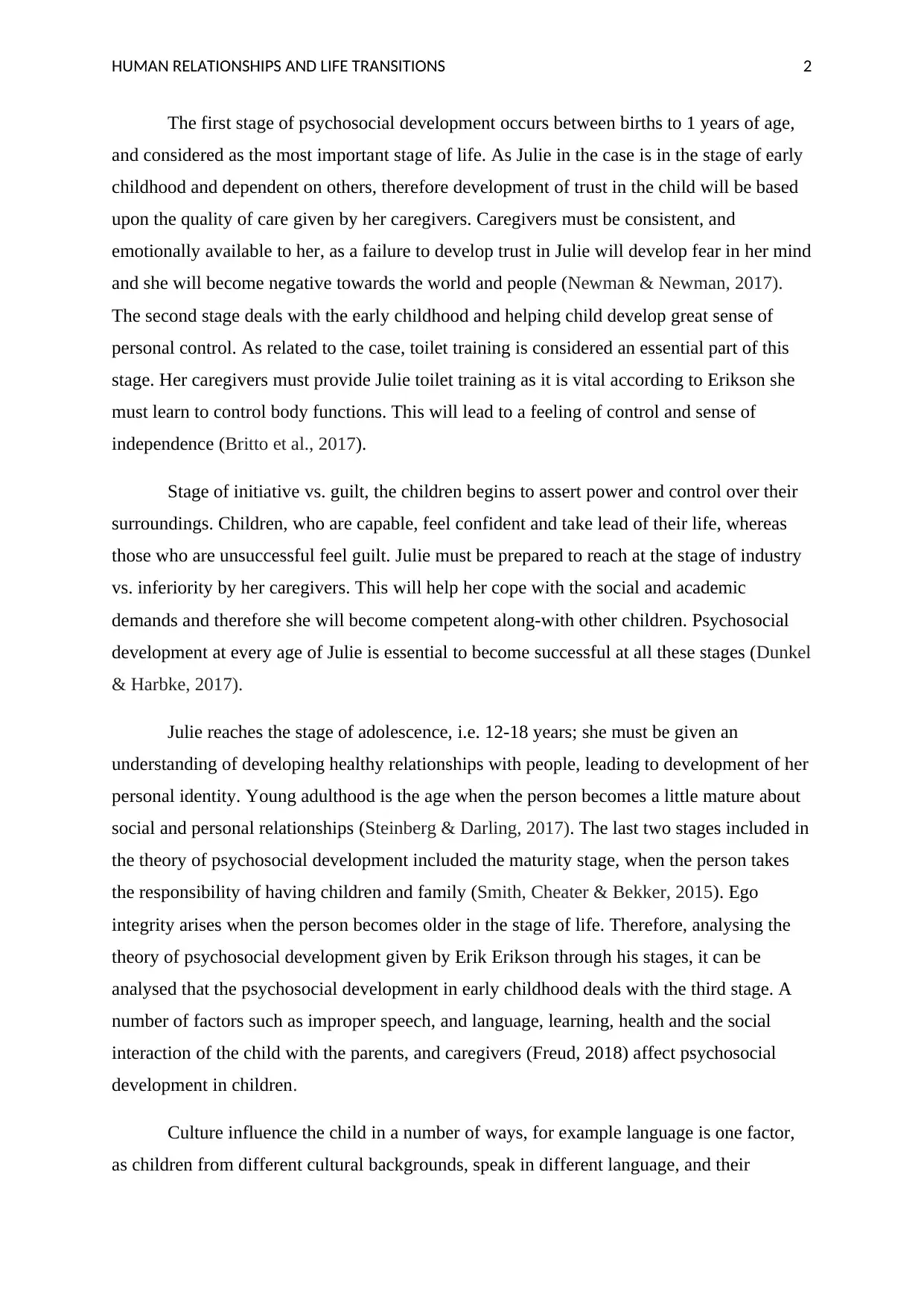
HUMAN RELATIONSHIPS AND LIFE TRANSITIONS 2
The first stage of psychosocial development occurs between births to 1 years of age,
and considered as the most important stage of life. As Julie in the case is in the stage of early
childhood and dependent on others, therefore development of trust in the child will be based
upon the quality of care given by her caregivers. Caregivers must be consistent, and
emotionally available to her, as a failure to develop trust in Julie will develop fear in her mind
and she will become negative towards the world and people (Newman & Newman, 2017).
The second stage deals with the early childhood and helping child develop great sense of
personal control. As related to the case, toilet training is considered an essential part of this
stage. Her caregivers must provide Julie toilet training as it is vital according to Erikson she
must learn to control body functions. This will lead to a feeling of control and sense of
independence (Britto et al., 2017).
Stage of initiative vs. guilt, the children begins to assert power and control over their
surroundings. Children, who are capable, feel confident and take lead of their life, whereas
those who are unsuccessful feel guilt. Julie must be prepared to reach at the stage of industry
vs. inferiority by her caregivers. This will help her cope with the social and academic
demands and therefore she will become competent along-with other children. Psychosocial
development at every age of Julie is essential to become successful at all these stages (Dunkel
& Harbke, 2017).
Julie reaches the stage of adolescence, i.e. 12-18 years; she must be given an
understanding of developing healthy relationships with people, leading to development of her
personal identity. Young adulthood is the age when the person becomes a little mature about
social and personal relationships (Steinberg & Darling, 2017). The last two stages included in
the theory of psychosocial development included the maturity stage, when the person takes
the responsibility of having children and family (Smith, Cheater & Bekker, 2015). Ego
integrity arises when the person becomes older in the stage of life. Therefore, analysing the
theory of psychosocial development given by Erik Erikson through his stages, it can be
analysed that the psychosocial development in early childhood deals with the third stage. A
number of factors such as improper speech, and language, learning, health and the social
interaction of the child with the parents, and caregivers (Freud, 2018) affect psychosocial
development in children.
Culture influence the child in a number of ways, for example language is one factor,
as children from different cultural backgrounds, speak in different language, and their
The first stage of psychosocial development occurs between births to 1 years of age,
and considered as the most important stage of life. As Julie in the case is in the stage of early
childhood and dependent on others, therefore development of trust in the child will be based
upon the quality of care given by her caregivers. Caregivers must be consistent, and
emotionally available to her, as a failure to develop trust in Julie will develop fear in her mind
and she will become negative towards the world and people (Newman & Newman, 2017).
The second stage deals with the early childhood and helping child develop great sense of
personal control. As related to the case, toilet training is considered an essential part of this
stage. Her caregivers must provide Julie toilet training as it is vital according to Erikson she
must learn to control body functions. This will lead to a feeling of control and sense of
independence (Britto et al., 2017).
Stage of initiative vs. guilt, the children begins to assert power and control over their
surroundings. Children, who are capable, feel confident and take lead of their life, whereas
those who are unsuccessful feel guilt. Julie must be prepared to reach at the stage of industry
vs. inferiority by her caregivers. This will help her cope with the social and academic
demands and therefore she will become competent along-with other children. Psychosocial
development at every age of Julie is essential to become successful at all these stages (Dunkel
& Harbke, 2017).
Julie reaches the stage of adolescence, i.e. 12-18 years; she must be given an
understanding of developing healthy relationships with people, leading to development of her
personal identity. Young adulthood is the age when the person becomes a little mature about
social and personal relationships (Steinberg & Darling, 2017). The last two stages included in
the theory of psychosocial development included the maturity stage, when the person takes
the responsibility of having children and family (Smith, Cheater & Bekker, 2015). Ego
integrity arises when the person becomes older in the stage of life. Therefore, analysing the
theory of psychosocial development given by Erik Erikson through his stages, it can be
analysed that the psychosocial development in early childhood deals with the third stage. A
number of factors such as improper speech, and language, learning, health and the social
interaction of the child with the parents, and caregivers (Freud, 2018) affect psychosocial
development in children.
Culture influence the child in a number of ways, for example language is one factor,
as children from different cultural backgrounds, speak in different language, and their
⊘ This is a preview!⊘
Do you want full access?
Subscribe today to unlock all pages.

Trusted by 1+ million students worldwide
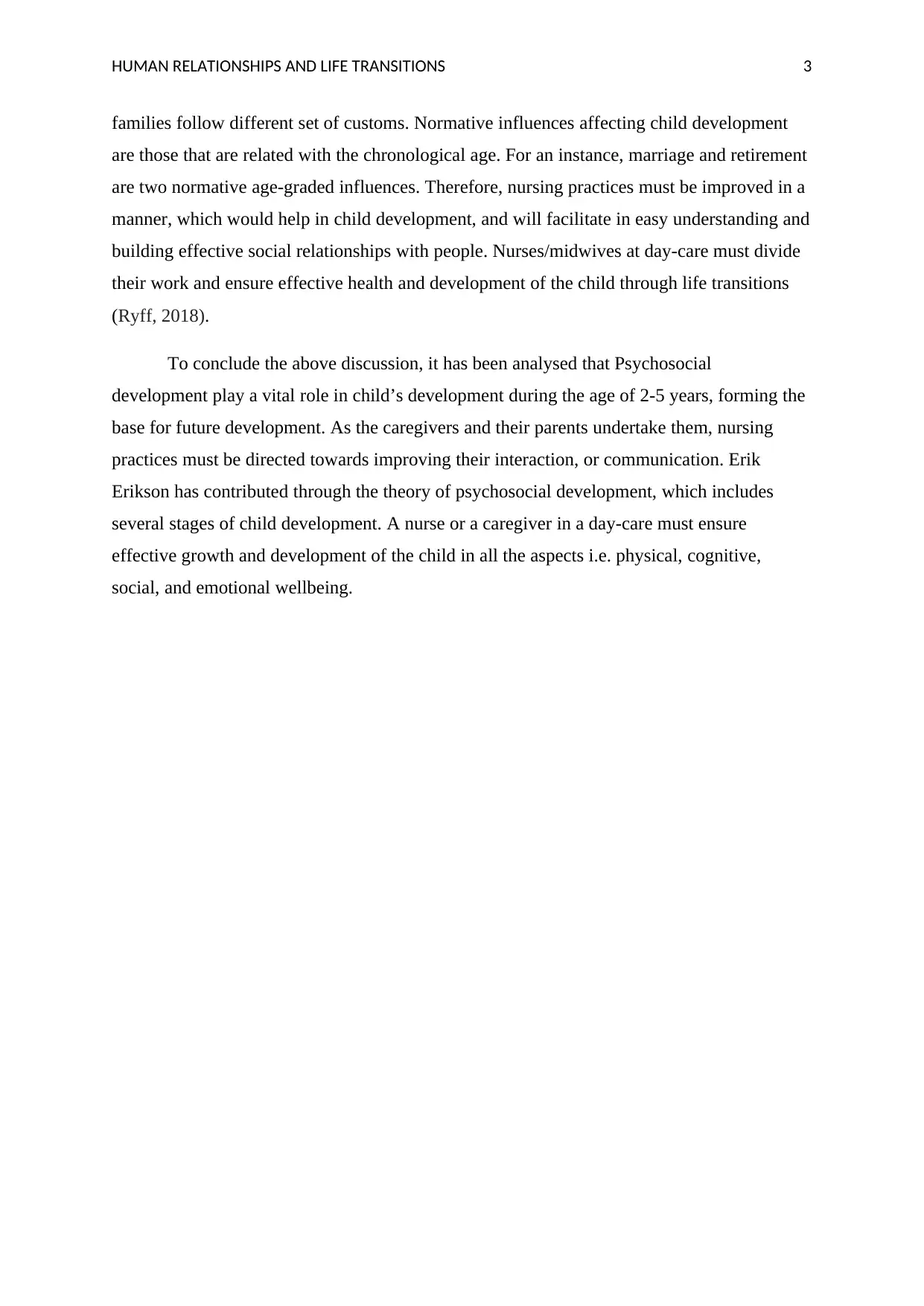
HUMAN RELATIONSHIPS AND LIFE TRANSITIONS 3
families follow different set of customs. Normative influences affecting child development
are those that are related with the chronological age. For an instance, marriage and retirement
are two normative age-graded influences. Therefore, nursing practices must be improved in a
manner, which would help in child development, and will facilitate in easy understanding and
building effective social relationships with people. Nurses/midwives at day-care must divide
their work and ensure effective health and development of the child through life transitions
(Ryff, 2018).
To conclude the above discussion, it has been analysed that Psychosocial
development play a vital role in child’s development during the age of 2-5 years, forming the
base for future development. As the caregivers and their parents undertake them, nursing
practices must be directed towards improving their interaction, or communication. Erik
Erikson has contributed through the theory of psychosocial development, which includes
several stages of child development. A nurse or a caregiver in a day-care must ensure
effective growth and development of the child in all the aspects i.e. physical, cognitive,
social, and emotional wellbeing.
families follow different set of customs. Normative influences affecting child development
are those that are related with the chronological age. For an instance, marriage and retirement
are two normative age-graded influences. Therefore, nursing practices must be improved in a
manner, which would help in child development, and will facilitate in easy understanding and
building effective social relationships with people. Nurses/midwives at day-care must divide
their work and ensure effective health and development of the child through life transitions
(Ryff, 2018).
To conclude the above discussion, it has been analysed that Psychosocial
development play a vital role in child’s development during the age of 2-5 years, forming the
base for future development. As the caregivers and their parents undertake them, nursing
practices must be directed towards improving their interaction, or communication. Erik
Erikson has contributed through the theory of psychosocial development, which includes
several stages of child development. A nurse or a caregiver in a day-care must ensure
effective growth and development of the child in all the aspects i.e. physical, cognitive,
social, and emotional wellbeing.
Paraphrase This Document
Need a fresh take? Get an instant paraphrase of this document with our AI Paraphraser
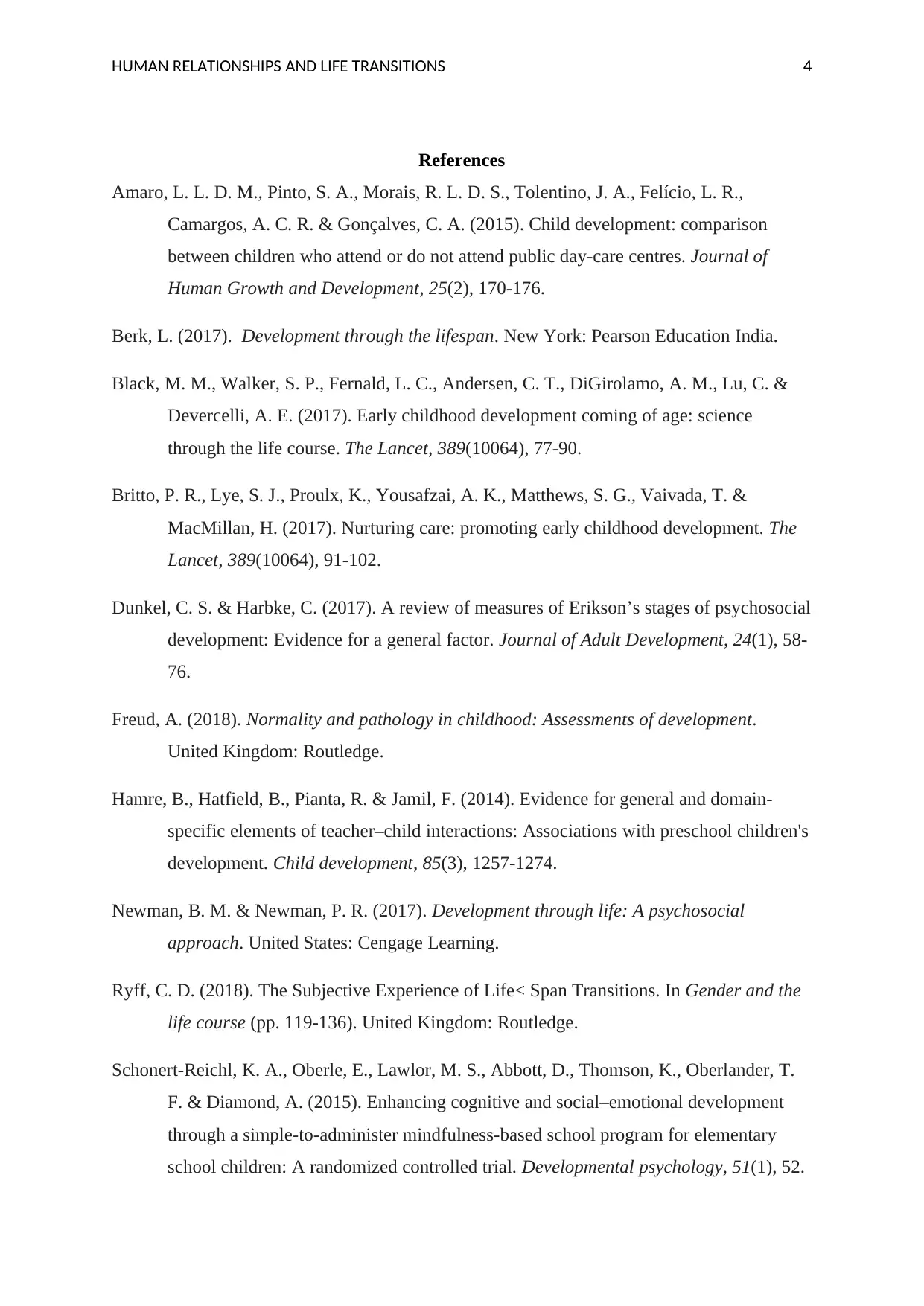
HUMAN RELATIONSHIPS AND LIFE TRANSITIONS 4
References
Amaro, L. L. D. M., Pinto, S. A., Morais, R. L. D. S., Tolentino, J. A., Felício, L. R.,
Camargos, A. C. R. & Gonçalves, C. A. (2015). Child development: comparison
between children who attend or do not attend public day-care centres. Journal of
Human Growth and Development, 25(2), 170-176.
Berk, L. (2017). Development through the lifespan. New York: Pearson Education India.
Black, M. M., Walker, S. P., Fernald, L. C., Andersen, C. T., DiGirolamo, A. M., Lu, C. &
Devercelli, A. E. (2017). Early childhood development coming of age: science
through the life course. The Lancet, 389(10064), 77-90.
Britto, P. R., Lye, S. J., Proulx, K., Yousafzai, A. K., Matthews, S. G., Vaivada, T. &
MacMillan, H. (2017). Nurturing care: promoting early childhood development. The
Lancet, 389(10064), 91-102.
Dunkel, C. S. & Harbke, C. (2017). A review of measures of Erikson’s stages of psychosocial
development: Evidence for a general factor. Journal of Adult Development, 24(1), 58-
76.
Freud, A. (2018). Normality and pathology in childhood: Assessments of development.
United Kingdom: Routledge.
Hamre, B., Hatfield, B., Pianta, R. & Jamil, F. (2014). Evidence for general and domain‐
specific elements of teacher–child interactions: Associations with preschool children's
development. Child development, 85(3), 1257-1274.
Newman, B. M. & Newman, P. R. (2017). Development through life: A psychosocial
approach. United States: Cengage Learning.
Ryff, C. D. (2018). The Subjective Experience of Life< Span Transitions. In Gender and the
life course (pp. 119-136). United Kingdom: Routledge.
Schonert-Reichl, K. A., Oberle, E., Lawlor, M. S., Abbott, D., Thomson, K., Oberlander, T.
F. & Diamond, A. (2015). Enhancing cognitive and social–emotional development
through a simple-to-administer mindfulness-based school program for elementary
school children: A randomized controlled trial. Developmental psychology, 51(1), 52.
References
Amaro, L. L. D. M., Pinto, S. A., Morais, R. L. D. S., Tolentino, J. A., Felício, L. R.,
Camargos, A. C. R. & Gonçalves, C. A. (2015). Child development: comparison
between children who attend or do not attend public day-care centres. Journal of
Human Growth and Development, 25(2), 170-176.
Berk, L. (2017). Development through the lifespan. New York: Pearson Education India.
Black, M. M., Walker, S. P., Fernald, L. C., Andersen, C. T., DiGirolamo, A. M., Lu, C. &
Devercelli, A. E. (2017). Early childhood development coming of age: science
through the life course. The Lancet, 389(10064), 77-90.
Britto, P. R., Lye, S. J., Proulx, K., Yousafzai, A. K., Matthews, S. G., Vaivada, T. &
MacMillan, H. (2017). Nurturing care: promoting early childhood development. The
Lancet, 389(10064), 91-102.
Dunkel, C. S. & Harbke, C. (2017). A review of measures of Erikson’s stages of psychosocial
development: Evidence for a general factor. Journal of Adult Development, 24(1), 58-
76.
Freud, A. (2018). Normality and pathology in childhood: Assessments of development.
United Kingdom: Routledge.
Hamre, B., Hatfield, B., Pianta, R. & Jamil, F. (2014). Evidence for general and domain‐
specific elements of teacher–child interactions: Associations with preschool children's
development. Child development, 85(3), 1257-1274.
Newman, B. M. & Newman, P. R. (2017). Development through life: A psychosocial
approach. United States: Cengage Learning.
Ryff, C. D. (2018). The Subjective Experience of Life< Span Transitions. In Gender and the
life course (pp. 119-136). United Kingdom: Routledge.
Schonert-Reichl, K. A., Oberle, E., Lawlor, M. S., Abbott, D., Thomson, K., Oberlander, T.
F. & Diamond, A. (2015). Enhancing cognitive and social–emotional development
through a simple-to-administer mindfulness-based school program for elementary
school children: A randomized controlled trial. Developmental psychology, 51(1), 52.
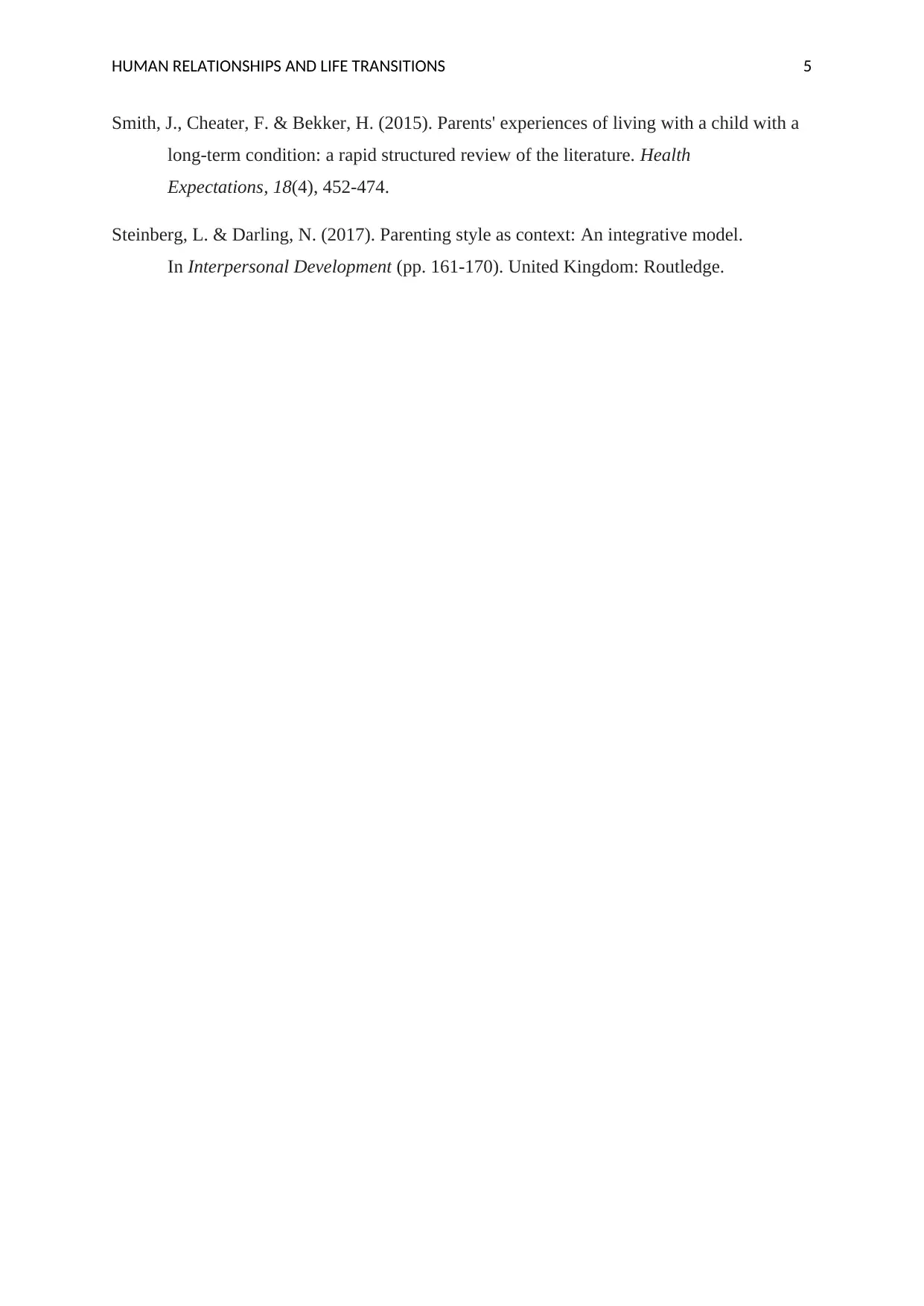
HUMAN RELATIONSHIPS AND LIFE TRANSITIONS 5
Smith, J., Cheater, F. & Bekker, H. (2015). Parents' experiences of living with a child with a
long‐term condition: a rapid structured review of the literature. Health
Expectations, 18(4), 452-474.
Steinberg, L. & Darling, N. (2017). Parenting style as context: An integrative model.
In Interpersonal Development (pp. 161-170). United Kingdom: Routledge.
Smith, J., Cheater, F. & Bekker, H. (2015). Parents' experiences of living with a child with a
long‐term condition: a rapid structured review of the literature. Health
Expectations, 18(4), 452-474.
Steinberg, L. & Darling, N. (2017). Parenting style as context: An integrative model.
In Interpersonal Development (pp. 161-170). United Kingdom: Routledge.
⊘ This is a preview!⊘
Do you want full access?
Subscribe today to unlock all pages.

Trusted by 1+ million students worldwide
1 out of 6
Related Documents
Your All-in-One AI-Powered Toolkit for Academic Success.
+13062052269
info@desklib.com
Available 24*7 on WhatsApp / Email
![[object Object]](/_next/static/media/star-bottom.7253800d.svg)
Unlock your academic potential
Copyright © 2020–2026 A2Z Services. All Rights Reserved. Developed and managed by ZUCOL.




